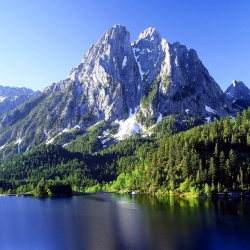
From 1971 to 2000, the world’s land areas were the warmest they have been in at least 1,400 years, according to a new study in Nature Geoscience. The massive new study, involving 80 researchers from around the world with the Past Global Changes (PAGES) group, is the first to look at continental temperature changes over two thousand years, providing insights into regional climatic changes from the Roman Empire to the modern day. According to the data, Earth’s land masses were generally cooling until anthropogenic climate change reversed the long-term pattern in the late-19th Century.
"Even just a few years ago we would have aimed for a single worldwide temperature series," says co-author Ulf Büntgen with the Swiss Federal Research Institute (WSL) and PAGES. "Nowadays, we know how important it is to have a better understanding of regional differences."
Scientists were able to reconstruct continental temperatures across every continent except Africa, where data is still lacking. They found that continents could still show important idiosyncrasies even in the midst of global trends.
"Distinctive periods, such as the Medieval Warm Period or the Little Ice Age stand out, but do not show a globally uniform pattern," explains co-author Heinz Wanner with the University of Bern and a member of PAGES.
The researchers found that such temperature changes occurred during different times on continents. For example, the Medieval Warm Period occurred from around 830 to 1100 AD in the northern hemisphere, but a similar warm-up period doesn’t show up in the southern hemisphere until 1160 to 1370 AD, a lag time of 300 years. Meanwhile, the Little Ice Age began decades earlier in the northern hemisphere than in the southern. The oddest continent proved to be Antarctica, which bucked trends elsewhere during several periods.
Looking at the temperature data over 30 years intervals allowed scientists to note that the most recent period (1971-2000) held the title for the warmest on record. Still, zooming into a continental view showed a slightly more diverse picture: for example, temperatures in Europe from 21-80 AD may rival those of 1971-2000. But globally the picture remains the same: over a thousand years of cooling, replaced suddenly by warming beginning in the late 19th Century. According to climatologists, temperatures have risen about 0.8 degrees Celsius (1.4 degrees Fahrenheit) in the last hundred years over land and sea due to burning fossil fuels, deforestation and other land-use changes, and industrial agriculture. The most recent decade was the hottest yet.
